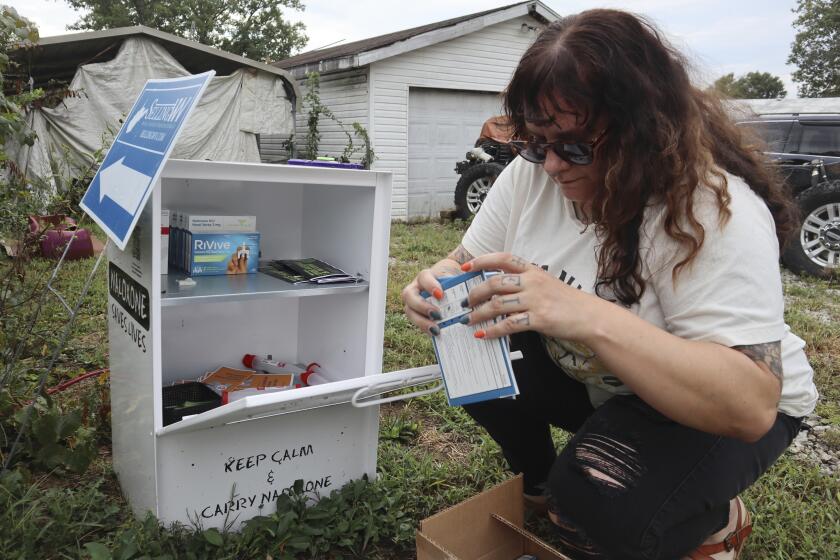Vietnam’s Veterans Get Lifelong Respect
Sometimes in the night, Be Van Nhop hears a voice that calls out from the next room, “Rush forward, comrades! The enemy’s everywhere!” and Nhop will answer softly: “Be still, Tran. You are having a bad dream. Be still.”
Tran falls silent, and the next morning he has forgotten the nightmare. By lunchtime, he has joined Nhop to watch a staff badminton match at the facility that both call home--the Thuan Thanh Rehabilitation Center for military veterans, most of whom were wounded in the war against the United States.
“In a way, we are lucky, because we live as a family here,” Nhop, 50, said of the center’s 136 paralyzed veterans. “We have sympathy for each other and love each other--and anyone who knows what it is to suffer in war.
“Sometime back, an American soldier from the war came to visit us. He had lost both legs. When we saw his condition, we cried and hugged him. We considered him one of us. The fact that we were enemies on the battlefield didn’t matter. Here at Thuan Thanh, we were friends.”
Each of Vietnam’s 57 provinces has a veterans center like Thuan Thanh, an hour’s drive northeast of Hanoi, and each center reflects the country’s philosophy in dealing with a war legacy of staggering proportions--1.2 million northern soldiers dead, by official count; perhaps 6 million wounded, including 800,000 who are classified today as invalids; and at least 200,000 wives turned into widows. Overall, one of every 10 Vietnamese was killed or wounded in the war.
Despite such casualties, one sees few crippled veterans relegated to the streets, a reflection of Vietnam’s belief that the best rehabilitation is to not isolate war invalids. Most are absorbed back into their families and villages, where they draw government benefits and are accorded a large measure of lifetime respect for their sacrifice.
“We have a saying in Vietnam that when you drink, you should remember the source,” said Huynh Van Trinh, director of foreign relations for the Veterans Assn. of Vietnam, one of the country’s most influential groups. “And these men and women are the source of our freedom and independence.”
Although the patients at the spotlessly clean, well-staffed Thuan Thanh facility require a degree of medical attention that makes returning home impossible, the center does not quite feel like a hospital. It is at the hub of a village by the same name. Some patients’ families have moved into the village to be near them, and village children have made adopted uncles of the vets without families, clambering aboard the invalids’ “flying dragon” wheelchairs that are propelled by hand.
“Sometimes you see psychological scars of wartime experiences,” said Dr. Dinh Van San. “But most of the veterans have dealt with their injuries in an amazingly optimistic manner. One man has learned how to repair radios. Another is writing short stories. Several are learning English. You’ll find surprisingly little self-pity or bitterness.”
“Sure, I wonder what my life would have been like if no war had happened,” said Nguyen Van Hoi, 56, a former lieutenant wounded in Quang Tri province in central Vietnam in 1972. “But if I am angry, it is mostly with myself. I need help to do anything. I see my friends feeding themselves, using the toilet, and I say, ‘If they can do that, why can’t I learn to take care of myself too?’ ”
As a matter of policy, soldiers from the defeated southern army are accorded the same benefits as those from the north. In practice, however, it doesn’t work that way. Those who fought for the north have a higher priority and get better access to medical facilities and more governmental support.
Benefits for the families of soldiers lost in combat include a one-time payment of $272--about a year’s salary for the average Vietnamese--plus a monthly payment of $21. Family members of those killed in war receive full medical coverage and school subsidies for their children.
“Heroic Mothers” who lost a son in battle--similar to Gold Star Mothers in the United States--receive additional benefits.
The Thuan Thanh center was established in 1965, the year the United States launched its campaign of sustained bombing in North Vietnam known as “Rolling Thunder.” The patients are free to come and go as they please and spend a good deal of time cruising the village’s dirt road in their “flying dragons,” often with a village child or two in their laps.
“For our children, what I want is that there is never another war,” said Pham Cong Lien, 50, who was wounded in a B-52 strike in 1971. “We have paid so greatly for our independence, but we all know that war is made by much higher authorities than us. We are here because we did a soldier’s duty.”
More to Read
Sign up for Essential California
The most important California stories and recommendations in your inbox every morning.
You may occasionally receive promotional content from the Los Angeles Times.










